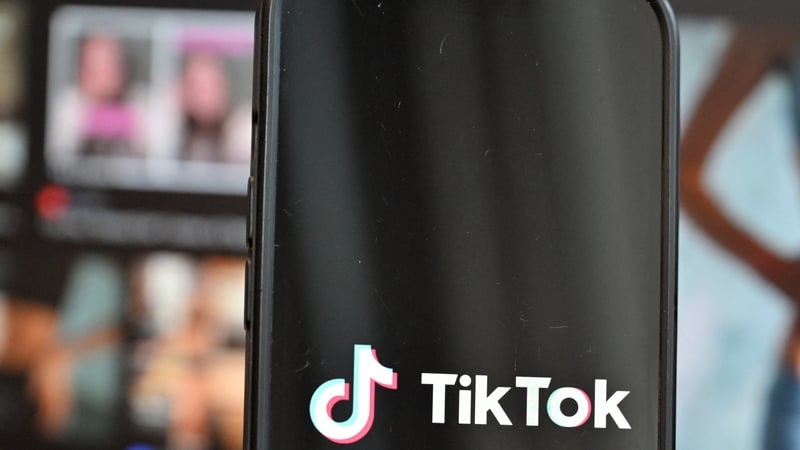The European Commission and Coimisiún na Meán have said they are aware of the issues linked to the trend known as ‘SkinnyTok’, the social media hashtag which promotes often dangerous advice to make people as thin as possible.
European Commission spokesperson Thomas Regnier said the protection of minors online was a “top priority”.
“Risks linked to TikTok’s algorithms are part of the investigation opened against TikTok in February 2024.
“Specifically, we are investigating TikTok’s mitigation measures in relation to harmful algorithmic recommendation, including in relation to eating disorders,” he said.
Head of Advocacy and Young Engagement at UNICEF Ireland Aibhlín O’Leary said that she frequently hears about SkinnyTok from teenagers, as part of the workshops she conducts in schools.
“Digital harm and online spaces come up a lot in our conversations,” she said.
“It’s primarily girls that talk about the impact of this trend, particularly on their self-esteem and the pressure to achieve this perfect, very skinny body, and the messages that they’re receiving from influencers and content producers on platforms like TikTok.”
As part of the UNICEF workshops, teens are asked what they would like to see change in relation to the issues that impact them.
In relation to SkinnyTok, Ms O’Leary said: “The greatest demands from young people are to do with companies like TikTok and Meta that are facilitating these platforms.
“We hear a lot of young people saying, these organisations like TikTok should be more accountable, that they should remove this content, they should put up warnings to let people know that this might be harmful, or it might even be related to an eating disorder”.

In a statement to RTÉ’s Morning Ireland, TikTok said it has “strict rules” against dangerous weight loss behaviours on its platform, and the app offers several wellbeing resources, ways to connect with experts.
It added that for teenage viewers, some content with harmful body ideals is age restricted.
Ms O’Leary said that the teenagers were able to distinguish between videos that promoted a healthy lifestyle and what they called ‘SkinnyTok’.
“SkinnyTok is where it moves into suggestions like ‘Summer is coming, so I better not eat’. That’s where the toxic element of it really comes in.”
TikTok account holder Valerie Spicer, who is based in the US, posts SkinnyTok content under the username housebunnygymrat.
“I share my journey and lessons learned through weight loss, binge eating, recovery and strengthening my self-concept,” Ms Spicer said.
In many of Ms Spicer’s videos she precedes her advice with the word “credentials” and points to a photograph of her past self in a larger body.
Ms Spicer explained that the reason she does that is to be “honest and accountable” with herself.
She added that she uses words such as a ‘fat’ and ‘skinny’ as a way of “taking control back from some of those words that can be a little bit polarising”.
Speaking from her home in Dallas, Texas, about the kind of videos she posts to TikTok, Ms Spicer said she receives far more positive feedback than negative.
“While I’ve used the SkinnyTok hashtag and that verbiage because it’s a popular topic, I’m still aware that topics like that do require nuance.
“So, I do try to balance sharing a subjective experience with an objective perspective.
“I’m not here to hurt anyone’s feelings. I definitely do take that feedback into consideration.
“I figure out how I could reword something if it’s truly, you know, causing more harm than good,” she said.
As well as mental health, physical health can also be influenced by content on SkinnyTok.
“Every person who comes to see me will admit that they have at some stage seen something online and they’re not too sure if what they’ve seen is true or not,” said dietitian Michaela Carrick.
Ms Carrick also makes TikTok videos under the username michaelanutrition responding to the incorrect health information seen under ‘SkinnyTok’ and similar hashtags.
“You can tell from a lot of their content [on #skinnytok] that [the TikTokers] are talking from personal experience, so it’s not based on scientific research or any evidence.

“It’s just ‘This worked for me and look at all these amazing results that I’ve gotten, you should do the same thing if you want to be like me’.”
Ms Carrick said that no healthcare professional would give advice to a patient or client based on their personal experience.
She added that content that gives personal advice for weight loss may be meant well, but could potentially cause harm if seen by a vulnerable person.
“A lot of this advice that we see online is acting as if everyone needs to eat exactly the same way, but everyone’s going to have completely different needs, Ms Carrick said.
“And then you add the complexity of people being young, developing, being quite impressionable and potentially having more issues with their body image or their relationship with food, while everything is changing.
“So definitely you shouldn’t be using this advice that people are sharing”.
Ms O’Leary of UNICEF acknowledged that the potentially harmful messages seen on the SkinnyTok hashtag have been around for a long time, including on other social media platforms.
“The content or the message isn’t something that’s particularly new, what may be different in TikTok is how powerful the algorithm appears to be.
“Young people are saying once you watch one of these videos, you’re just hooked into this spiral of them, and you just see and more and more of this content.
“We definitely hear people saying that their mental health has suffered, that their self-esteem has gone down, that they’re comparing themselves to other girls online to women online whose body looks nothing like theirs”.
Coimisiún na Meán is assisting the European Commission with its investigation into TikTok.
In a statement, Coimisiún na Meán said that is recognises the potential harm for children caused by leading them down ‘rabbit holes’ through recommender systems used by platforms.



